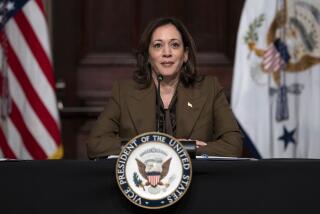Reagan Discounts Summit-Pact Link : Meeting Isn’t Needed for Arms Treaty, He Says
- Share via
WEST POINT, N.Y. — President Reagan said Wednesday that he would welcome a visit to the United States by Soviet leader Mikhail S. Gorbachev but that a summit conference “is not a precondition for progress” on the superpowers’ arms control agenda.
Reagan, described by aides as taking care not to raise expectations about a summit in the wake of earlier disappointments, said, “When the general secretary is ready to visit the United States, I and the American people will welcome him.”
The President spoke to the corps of cadets at the U.S. Military Academy, several hours after the White House and the Soviet Union formally announced that Soviet Foreign Minister Eduard A. Shevardnadze will meet with Reagan on Friday.
Snag on Space System
The White House meeting will take place one week after U.S.-Soviet negotiations intended to lead to a summit appeared to hit a snag in Moscow over continued Soviet insistence that limits be imposed on space weapons, including the U.S. Strategic Defense Initiative missile defense system.
The White House announcement said the Soviet foreign minister will make “a brief working visit” beginning Friday, that he is expected to carry a letter from Gorbachev to Reagan and that the talks would continue those that Shevardnadze and Secretary of State George P. Shultz held last week in Moscow and last month in Washington.
White House officials say they feel that Gorbachev may have re-emphasized his interest last week in obtaining limits on SDI, popularly known as “Star Wars,” as a last-ditch gamble, hoping that the President’s domestic political problems would entice him to accept the restrictions in exchange for a summit conference and completion of a treaty eliminating U.S. and Soviet medium- and shorter-range nuclear weapons.
“Shultz and the President slammed the door on that very quickly,” said an Administration arms control expert, speculating that the U.S. reaction has led to “a retrenchment in progress” in Moscow.
Now, he said, the Soviets appear ready to put arms control efforts and progress toward a summit “back on track,” leading to some optimism that dates for a summit conference can be set during the Shevardnadze visit.
Before Gorbachev raised the space weapons issue last Friday in Moscow, White House officials had spoken about the possibility that the Soviet leader would visit the United States during late November. The President said at a news conference barely 12 hours before the Moscow talks ended that he wanted to play host to Gorbachev at his ranch northwest of Santa Barbara.
Reagan, speaking Wednesday to more than 4,000 cadets, said that “summits can be useful for leaders and for nations--occasions for frank talk and a bridge to better relations. It would be good for Mr. Gorbachev to see this country for himself.
“I am ready to continue and intensify our negotiations but a summit is not a precondition for progress on the agenda at hand,” Reagan said.
Reagan told the cadets that Shultz’s meetings in Moscow produced “important positive movement toward an INF agreement,” referring to a pact to eliminate medium- and shorter-range nuclear weapons (known as the Intermediate Nuclear Force), and also made progress in other areas.
In addition, “much progress has been made in reaching accord on our proposal of cutting strategic arsenals in half,” he said. Strategic weapons are long-range systems capable of striking targets at ranges greater than 3,000 miles from the launch-point.
‘Historic Results’
Indeed, the President said, the U.S.-Soviet arms control efforts “may soon be yielding historic results.”
But, he said, “the Soviets must . . . stop holding strategic offensive reductions hostage to measures that would cripple our SDI--particularly since the Soviets are already spending billions on a strategic defense program of their own.”
At the same time, the President insisted that the United States would not retreat from its commitment to maintain tactical, or battlefield, nuclear weapons in Europe.
“Further nuclear reductions can take place only in the context of a substantial improvement in the balance of chemical and conventional forces,” the President said. He referred to concerns, particularly in Europe, that the removal of the U.S. nuclear “umbrella” will leave Western Europe vulnerable to superior conventional, or non-nuclear, forces of the Warsaw Pact nations.
A White House official, commenting on the low-key tone of the President’s remarks, said: “We have to be low-key on expectations. All we’re saying is Shevardnadze is coming and we’ll talk to him. As for expections beyond that, we don’t have any.”
The Administration arms control expert, acknowledging Soviet concern that future talks involving Gorbachev and Reagan deal with the “Star Wars” program, said the President is “prepared to discuss the full agenda.”
But, he said, that does not mean Reagan is prepared to show new flexibility that would lead to restrictions on the space defense program.
The visit to West Point was the President’s second since taking office. Before delivering the speech, he reviewed the corps of cadets on parade on The Plain and ate lunch with the cadets in Washington Hall, the dining facility.
More to Read
Sign up for Essential California
The most important California stories and recommendations in your inbox every morning.
You may occasionally receive promotional content from the Los Angeles Times.













